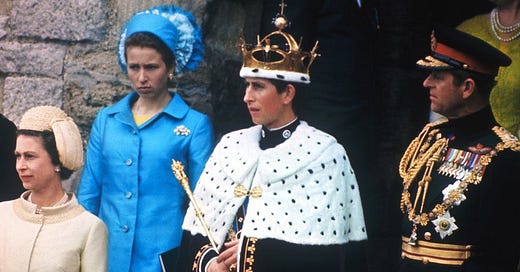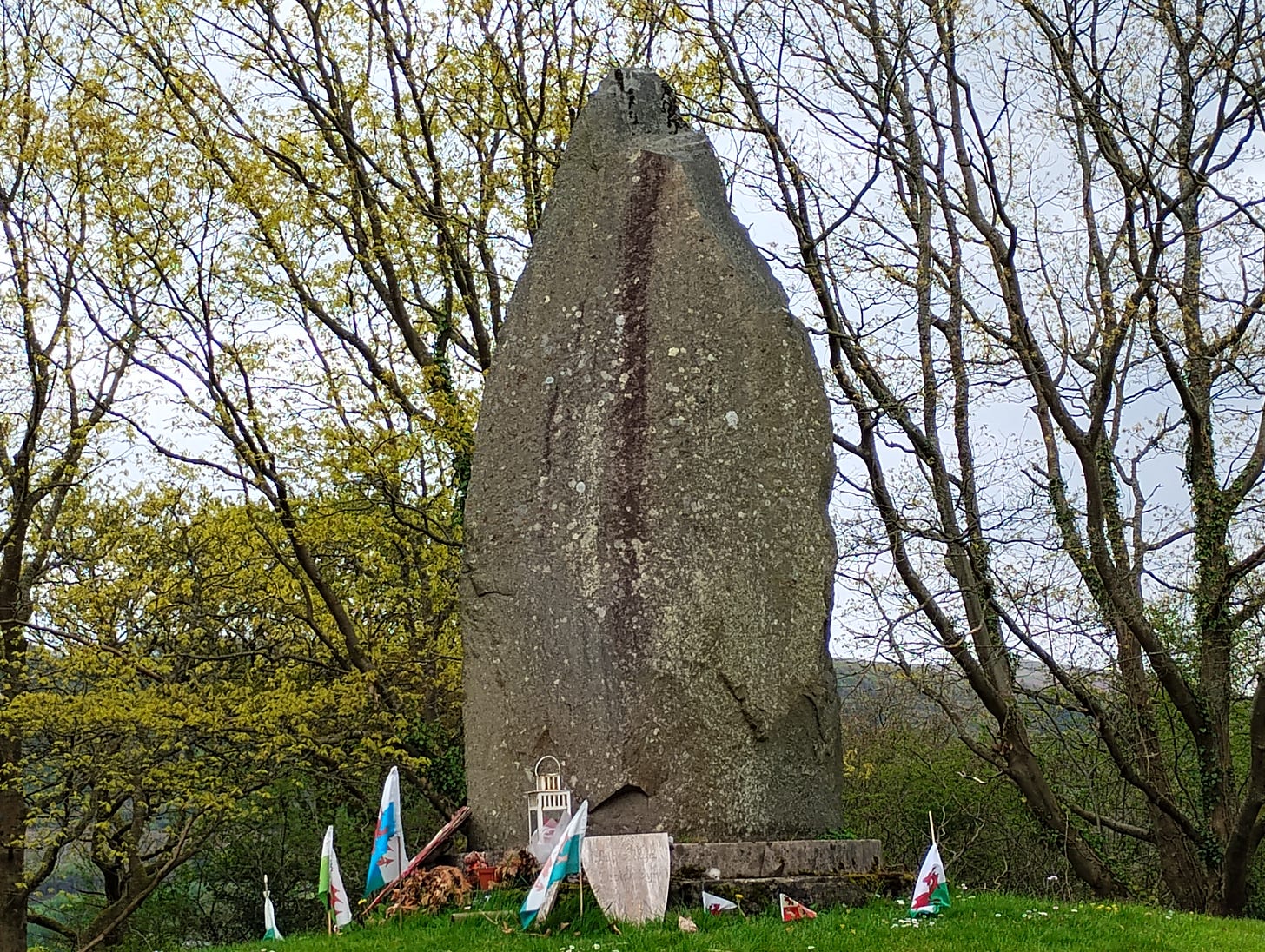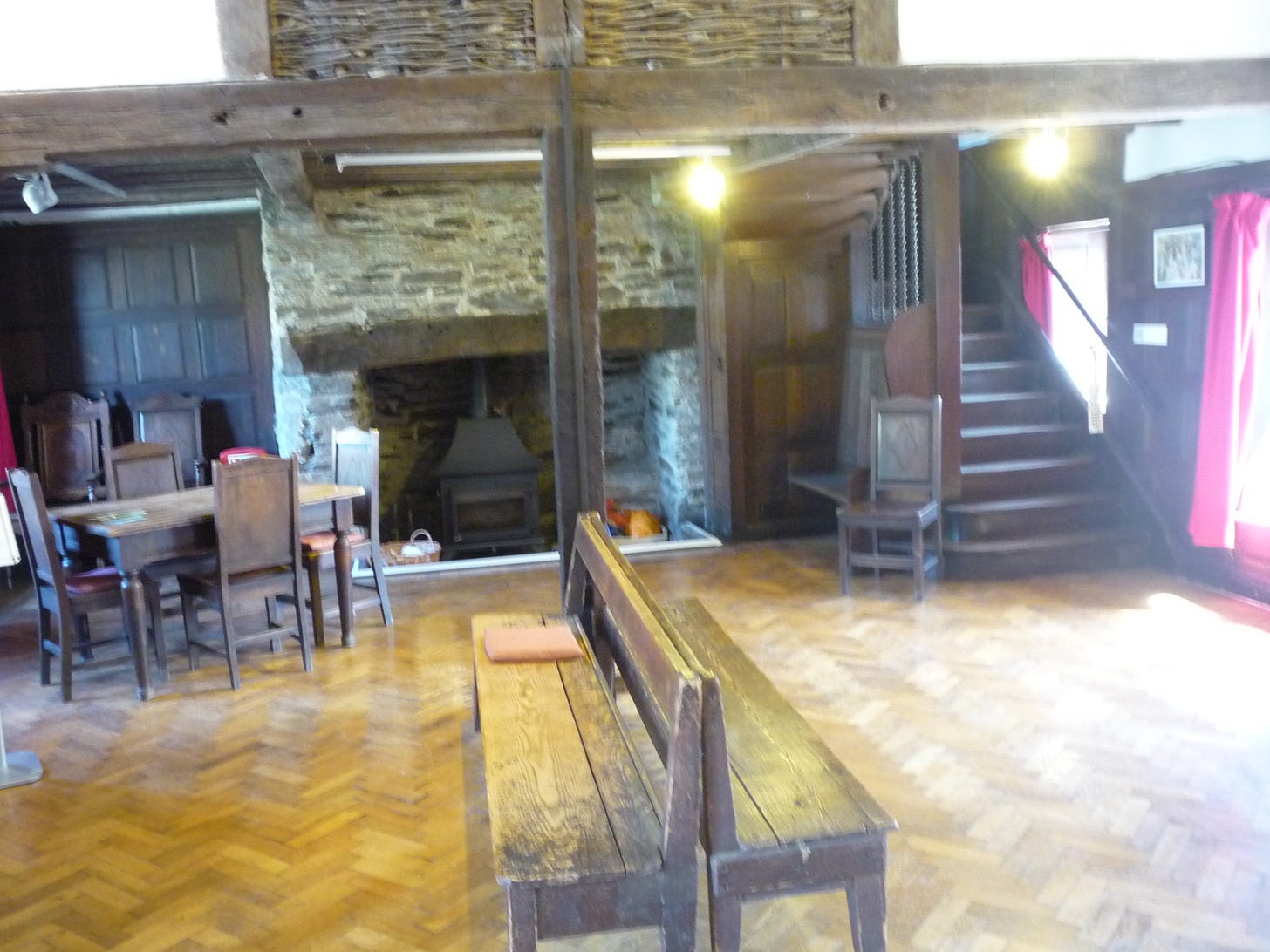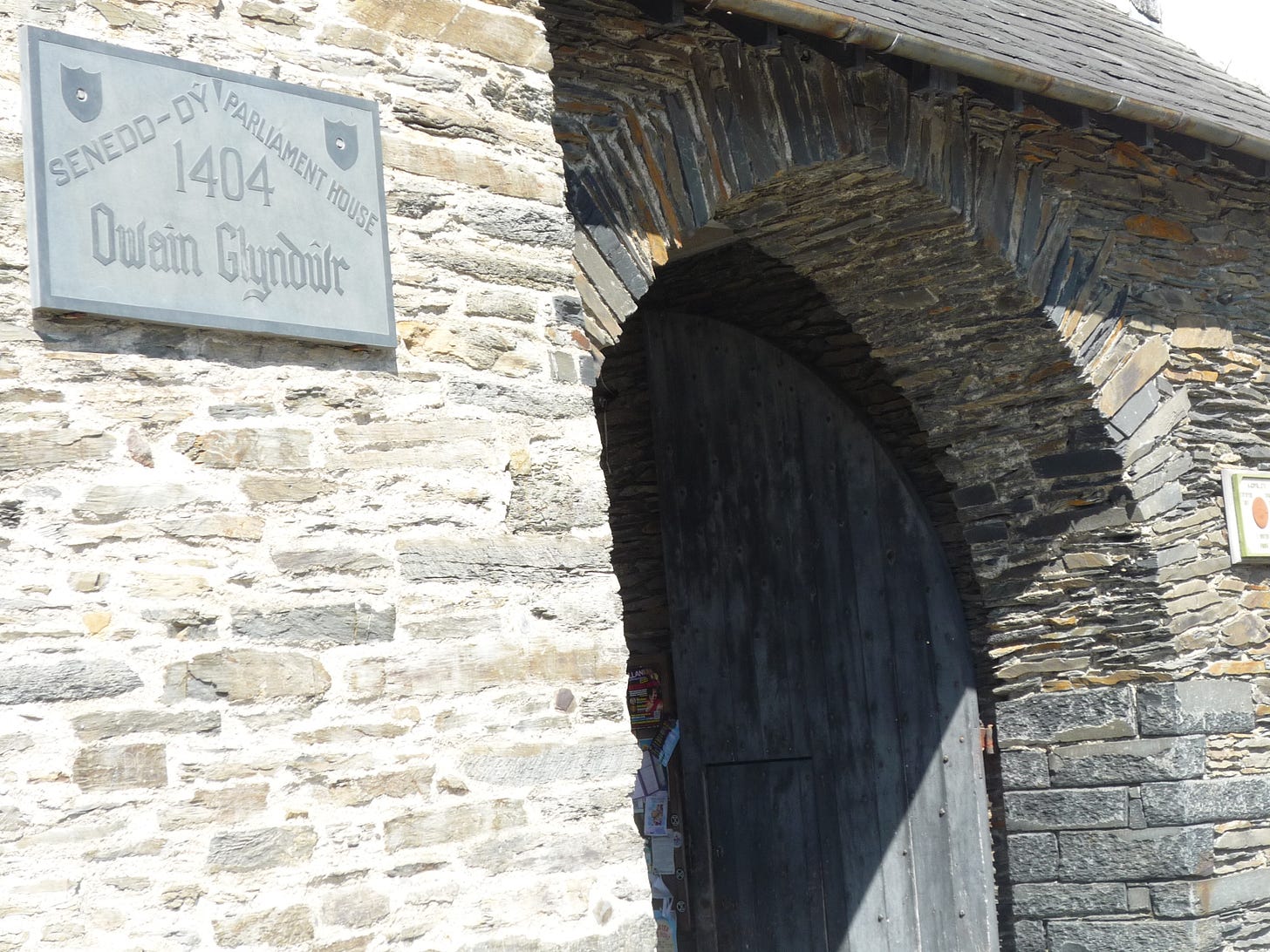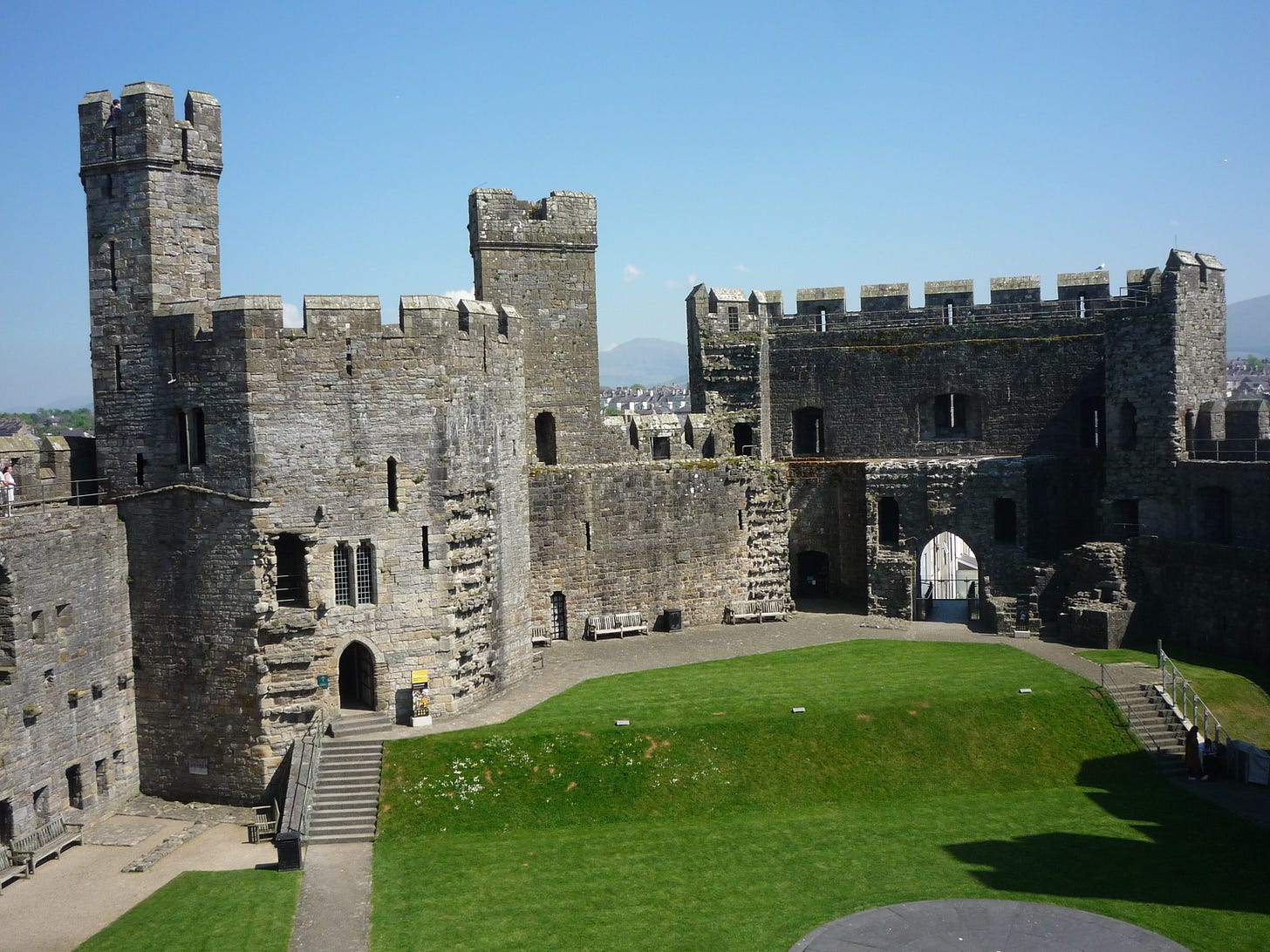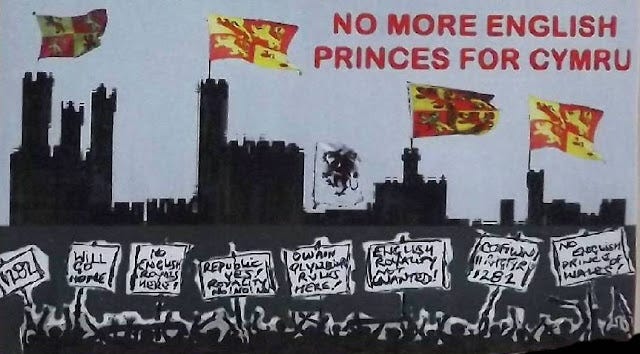Carlo Prince of Wales can't speak Cymraeg
The never-ending battle against Anglo-Norman British imperial conquests
When Charles Windsor was invested by his mother in 1969 with the title Tywysog Cymru -- Prince of Wales -- it provoked an explosive revolt among his far from loyal prospective subjects. Later that year, the Black Panther Party's deputy chairman for Illinois, Fred Hampton, would be murdered by Chicago police. It was less than a year after Martin Luther King was assassinated in Memphis. But I had never heard of the revolt in Wales.
There was a Free Wales Army, with bold paramilitary uniforms, but the bombing campaign was run by Mudiad Amddiffyn Cymru (MAC) and more peaceful protests by Cymdeithas yr Iaith and the Patriotic Front. (Yes, this was eleven years before Zimbabwe replaced Rhodesia under the leadership of another Patriotic Front).
The last native born Prince of Wales, Llewelyn ap Gruffydd, was killed in 1282 by knights in the service of Edward I, Norman king of England. The spot is marked by a standing stone in Cilmeri near Builth Wells, where people still leave flowers and flags. The newest stand-in for Prince of Wales told Murray Jenkins, leading more than 300 protesters in June 1968, that he knew nothing about that. The day before, MAC had blown up a pipe in a viaduct taking water from Wales to the English port of Liverpool.
Edward added insult to injury by appointing his own infant son Prince of Wales in 1284, dryly noting that the baby spoke neither English nor French, and not Latin either. This was an early version of the mindset that later added Empress of India to the titles possessed by Queen Victoria. This all happened on the walls of Caernarfon Castle, built for the express purpose of ending any hope of Welsh independence. It was from these same walls that Queen Elizabeth proposed to invest her son with the borrowed title -- or actually, it was first the idea of Harold Wilson, who passed for a Labor Party leader.
A popular musician, Dafydd Iwan, wrote a song lampooning the Prince as his polo playing "little friend" named "Carlo Windsor" who lives in Buckingham Palace. (In Welsh it comes out "Muckingham Palas." Consonants beginning certain words are softened in certain syntax.) The BBC refused to play it. It nevertheless was first of the Top Ten songs in Caernarfon, three spots above Martha and the Vandellas' "Dancing in the Streets."
As in almost any colonial possession of the British Empire, there were those deeply committed to native culture, who were conservative, and even monarchist. One such was the editor of the Herald newspaper group in Caernarfon -- the heartland of the Welsh language. John Eilian harumphed in print that Iwan's "series of insulting verses about the Prince" were in very bad taste, calling them "a hymn of hate." Iwan got death threats from monarchists, saying if you come here you won't get out alive. But, he lived in the area, often sang in the area, and anytime he asked the folks in a pub what he should sing, they asked for "Carlo."
How is word of this neglected history coming to the light of day? Its amazing what you can find in a bookstore in Cymru, generally referred to by the State Department as the Principality of Wales. There is a cheerful book shop at one end of the building where Owain Glyndwr, the last prince who sought to lead Cymru as an independent nation, convened the last independent Senedd, in Machynlleth. The staff only speak English if a customer can't do any better.
There on the rack was a newly published book from Y Lolfa, Ceredigion, Arwell Vittle's Charles and the Welsh Revolt: The Explosive Start to King Charles III's Royal Career.
One of the most embarrassing incidents for the young Saesneg prince was posed by a young lady named Mari Lyn, who had won an essay contest sponsored by the Wales Conservation Society. When a Royal Invitation arrived for her to be congratulated by the prince, she refused to consider going. After all, her older sisters were in college, taking part in protests against the investiture. Her brother was an ardent nationalist. But her father told her it was 'an opportunity and experience too good to miss.' He was right.
Appearing in a long blue dress and high heels, she received Carlo's congratulations, responding with impeccable courtesy, "Noswaith dda, i diolch y ti." He had to ask "What did she say?," and she followed up in English "What? Do you not understand greetings and thanks in Welsh?" Security deposited her outside the door. What she had said in her native language was 'Good evening, and thank you.' Unfortunately nobody seems to have taken a photograph.
Gareth Miles, chair of Cymdeithas yr Iaith, saw no problem with a variety of different resistance happening all at once. "Personally, I saw a sitution developing in Wales similar to what you saw in other colonies, where you have three factions: a constitutional party, an underground movement, and protesting students. And that there is mutual understanding between them." Harold Wilson and his home secretary, James Callaghan, were worried. They set up a special security unit led by Special Branch officers. They never seem to have asked themselves, "What would Jennie Lee do? What would Keir Hardie do?"
Carlo's life was never in danger, but John Jenkins, organizer of MAC, wanted the English authorities to worry whether they could guarantee his safety. Maybe they would call off the investiture ceremony. Gwenllian Wynne-Jefferies was on the front page of the Observer color magazine after she and her husband threw a smoke bomb at the unwelcome prince. A modest army of occupation set up camps outside Bangor and Caernarfon. Plain clothes police followed investiture protestors everywhere.
Of course the government went ahead with the investiture ceremony 1 July 1969. Queen Elizabeth recalled later that she had been pleased to reach the 'comforting security' of Caernarfon Castle's walls -- which is precisely what the castle had been built for. There was a ball that evening, where the electricity failed, the alcohol ran out, and the phone lines were out of order.
The book is timely because, at the age of 73, the man invested as Prince of Wales in 1969 became king of Great Britain, and of the last 13 commonwealth nations that had not declared themselves republics and broken with the monarchy. He passed on the title Prince of Wales to his son William, who backed the England football team rather than the Wales football team at the 2022 World Cup. Many in Wales would like to become a republic also.
Elfed Wyn ap Elwyn, a municipal councillor for Blaeneu Ffestiniog, remarked "This archaic oppressive tradition is a blight on our nation and has been for centuries." He added "It makes no sense, in my view, that so much public money is used to sustain the Royal Family." Perhaps Great Britain will simply restore the Commonwealth. But for now, it seems unlikely there will be a big formal investiture -- and a lot of people are ready to revolt if it is tried. Some have even carried signs saying “No More Kings.”

